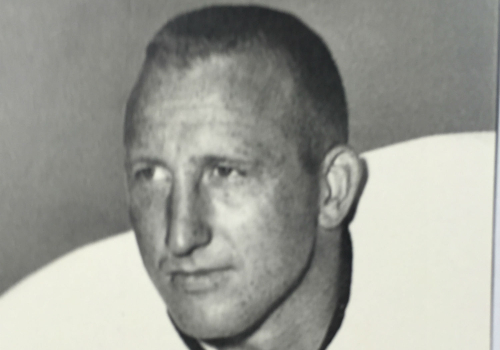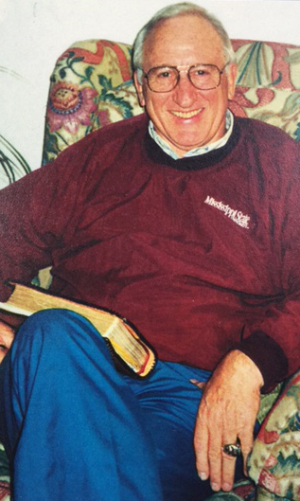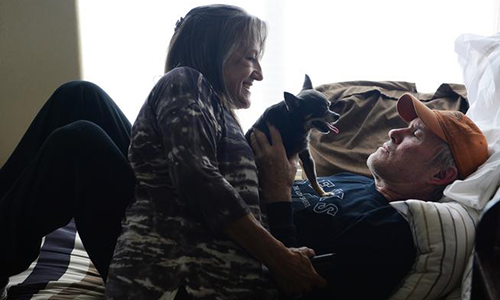Legacy Stories
Willie Daniel
Willie Daniel was a talented football player who played defensive back for Mississippi State University. Willie went on to have a nine year career in the NFL with the Pittsburgh Steelers and the Los Angeles Rams before retiring due to a knee injury. Towards the middle of his life, his mental facilities began to fail him and he had to stop working in 2001. He developed short-term memory loss and suffered severe mood swings. He soon became too combative and was placed in a home for Alzheimer's patients and was later moved to a full care facility. Daniel passed away at the age of 77 in 2011. His family donated a portion of his brain and spinal fluid to the VA-BU-CLF Brain Bank for CTE research with a goal of making sports safer in the future.

Willie Daniel’s pro football career eventually cost him his memory, but it also brought a good life for his family. The former NFL player, a Mississippi native, died at his home after a lengthy illness surrounded by his loving family and devoted friends.
Willie was born on November 10, 1937 in New Albany, MS. He grew up in Macon, MS, where he lettered in basketball, track, baseball, and football at Macon High School all four years. He received a scholarship to Mississippi State University where he lettered in track and football for four years before graduating in 1959.
His professional career took an unexpected turn, said wife Ruth. “Willie wasn’t drafted out of college and was hired as an assistant football and head track coach in Cleveland, MS. He received wide publicity when an irate parent became physical with him because the coach didn’t play his son in a game. When approached by the Steelers to turn pro, he quickly changed his mind about being a coach, joking that “Pro-ball wouldn’t be any rougher than this.”
Willie became a nationally known sports figure in the 1960s as a result of a stellar football career which began at Macon Mississippi High School and continued though Mississippi State University. His professional career took off quickly and he spent nine years with the National Football League where he gained a reputation as a speedy defensive back. The Pittsburgh newspapers listed him as one of the prize rookies of the year in 1961. In 1986 he was inducted into the Mississippi State Sports Hall of Fame. He spent six years with the Pittsburg Steelers and three years with the Los Angeles Rams until a knee injury forced him to retire in 1969.
He returned to Starkville, Mississippi, and became a partner in a very successful general insurance agency. Willie also recognized that the fitness industry was about to explode and he saw an opportunity to become one of the pioneers in the operation of health clubs which have remained a national obsession. He opened the Willie Daniel Athletic Club in 1970 and offered weights, aerobics, massage therapy, sauna, steam baths, karate, and a nursery for children. In 1975 he built the first of two racquetball courts which led to the formation of the Mississippi Racquetball Association.
Somehow Willie found the time to give back to his community. He coached and sponsored Starkville junior baseball teams as well as the Starkville Open Football League. He served as chairman of the annual Oktibbeha County Cancer Crusade which became the first county in Mississippi to triple its annual contribution quota. He was a member of the Mississippi State “M” Club, Bulldog Club, “Old Dawgs” Club, and the National Football League Players Association. He was a member of the First United Methodist Church in Starkville, the Fellowship of Christian Athletes, and the Savage Bible Class where he served as President. He was one of the original members of the Starkville Kiwanis Club, and the Starkville Country Club where he made the club’s first “hole-in-one” in 1975.
Willie and his wife, Ruth, raised three children, Sandra (husband Jeff), Kent (wife Evalin), and Richard. They have four grandchildren and one great grandchild. Life was busy, but good—as one of the neighbors used to say, “When I grow up, I want to be Willie Daniel!”
By the time the clock registered the new millennium, Willie was facing the most monumental challenge of his lifetime when his mental health began to deteriorate. Actually, his mental health had begun to deteriorate in the 1980s but he was able to work until 2001. This downward spiral into the world of dementia was attributed to the numerous concussions he suffered during his football career.
Willie became very frustrated, angry, and sad. He lost his short-term memory, couldn’t even remember his birthdate or the birthdates and ages of his children and grandchildren. One very traumatic event for him was the day his family had to take his truck keys and remove his truck. He would actually cry and beg to get his truck back. He never could understand why he couldn’t drive and this became a daily verbal confrontation.
By 2009, he was becoming more and more combative. He never actually hit anyone, but he was threatening to his wife and his caregivers. His family made the agonizing decision to move him to an Alzheimer’s facility. He lived there for a year, but then had to be moved to a full care nursing facility. For the last six years of Willie’s life, he was incontinent, could not sit up, had very little movement in his arms or legs, and hadn’t spoken in six years. He was moved from his bed to his wheelchair with a lift, and was tube fed.
The road that Willie and his family traveled over these past several years has been difficult to say the least. But as Ruth says, “My heartbreak is nothing compared to what Willie has faced. He loved his God, his family, his life, his friends, his church with all his heart. He lost that all far too soon.”

Willie qualified for and became a part of a state-of-the-art research project at Boston University being conducted on football head injuries. He donated a portion of his brain and spinal cord for the research project in hopes of developing procedures and equipment to make the sport safer for athletes of the future.
You May Also Like

Those struggling with suspected CTE are not the only ones who need support. View tools and resources for CTE caregivers.
Caregiving for CTE
Staying active, eating well, and maintaining healthy sleep habits can make a world of difference when managing CTE symptoms. Take it from Mike Adamle.
The Mike Adamle Project: Rise Above